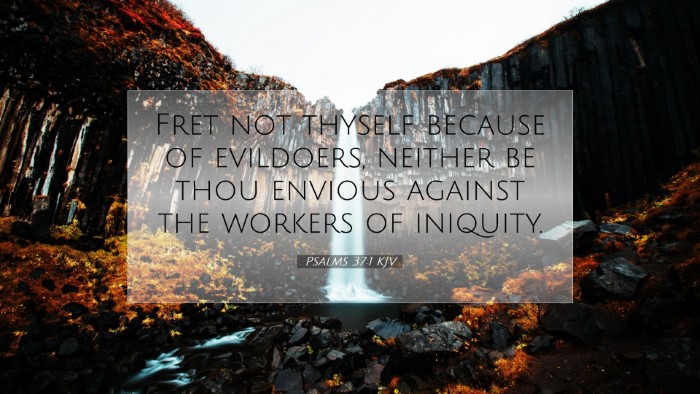Psalms 37:1 - Commentary Summary
Text of the Verse: "Fret not thyself because of evildoers, neither be thou envious against the workers of iniquity."
Introduction
The verse from Psalms 37:1 serves as a profound exhortation against allowing the actions and success of evildoers to disturb our peace. In a world where the wicked seem to prosper, this passage reminds believers to maintain their trust in God and not be swayed by visible circumstances. The combined insights of renowned commentators such as Matthew Henry, Albert Barnes, and Adam Clarke help to elucidate the deeper meanings enfolded within this verse.
Matthew Henry's Insights
Matthew Henry, in his well-regarded commentary, emphasizes the emotional aspect of "fret not thyself." He interprets it as a call to avoid unnecessary anxiety and agitation in the presence of wrongdoers. Henry points out several themes:
- The Nature of Envy: He highlights that envy is a natural inclination of the human heart, particularly when we witness the success of those who engage in wrongful acts. He urges readers to reflect on the trustworthiness of God in the face of injustice.
- The Illusion of Prosperity: According to Henry, the apparent success of evildoers is often a fleeting illusion. He stresses that their prosperity may lead to a dreadful end, while the righteous will ultimately inherit the earth.
- The Call to Faith: The core message is a call to faithfulness and trust in God’s ultimate justice. Believers are encouraged to recognize that God sees all actions and will execute His justice in due time.
Albert Barnes’ Interpretation
Albert Barnes offers his perspectives rooted in theological reflection and practical application:
- Contextual Understanding: Barnes emphasizes understanding the context of the Psalm, which is meant to comfort those distressed by the wickedness around them. He interprets "fret not" as an important directive to maintain spiritual equilibrium.
- Theological Perspective: Barnes explains that God’s justice may not always manifest instantly, and this can be a source of doubt for believers. He encourages steadfast faith, reminding us that the temporal success of the wicked does not equate to divine approval.
- Warning Against Bitterness: His commentary warns against developing a bitter heart due to the prosperity of evildoers. Instead, believers should focus on the character of God, who is ultimately righteous and just.
Adam Clarke's Analysis
Adam Clarke provides a scholarly analysis emphasizing the moral and ethical dimensions of the verse:
- Exhortation to Resilience: Clarke interprets the command to not fret as an encouragement to resilience in faith. He notes that despite the visible success of the unrighteous, unwavering belief in God’s faithfulness will yield the true peace of mind.
- A Broader Context: Clarke places this verse within the broader narrative of Psalm 37, which covers themes of divine providence and the eventual fate of the righteous versus the wicked.
- Practical Advice: He provides practical advice, encouraging believers to seek personal righteousness and observe their own behavior rather than becoming distracted by the immoral successes of others.
Thematic Insights
When examining Psalms 37:1 through these commentaries, several key themes emerge:
- Trust in God: The primary theme of this verse is the call to trust in God’s timing and justice, emphasizing that earthly measures of success do not define righteousness.
- Righteous Living: The focus on how one lives in response to the actions of evildoers is crucial. Believers are encouraged to persevere in righteousness despite the temptations to engage in envy or bitterness.
- Divine Justice: The ultimate assurance that God will judge impartially serves as a comfort amid worldly injustice, reminding believers that His justice will prevail.
Application for Today’s Believers
In a contemporary context, the exhortation found in Psalms 37:1 is incredibly relevant. As pastors, students, theologians, and scholars reflect on this verse, they should consider how it applies to their lives and ministries:
- Encouraging Others: The teachings derived from this verse can be used to encourage congregations facing despair due to the apparent success of immoral individuals in society.
- Personal Reflection: Individuals are invited to reflect on their hearts and attitudes towards success and fame and to examine any feelings of jealousy or resentment.
- Promoting a Culture of Hope: Emphasizing the hope found in God’s promises can invigorate faith communities, motivating them to seek righteousness and justice in their own lives.
Conclusion
Psalms 37:1 captures an essential faith principle: do not let the existence of evil discourage your spirit. Embracing insights from scholars like Matthew Henry, Albert Barnes, and Adam Clarke enables a richer understanding of this verse, encouraging a life of trust, righteousness, and peace. Believers are reminded that God is just, sovereign, and ever-present, inviting them to remain steadfast in faith amidst worldly trials.


